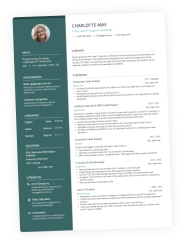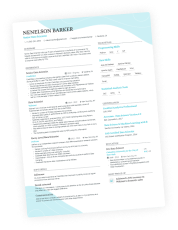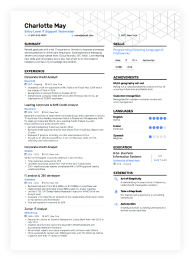When writing your CV, don’t discount the importance of the education section.
It’s easy to just mention your degree without a second thought, but your educational achievements should be highlighted just like any other accomplishment.
After all, you put in the work and earned that degree. Let it shine!
Education plays an important role in your CV. Effectively presenting your educational background demonstrates your qualifications and expertise.
Your education section should be tailored to your career stage and target job.
The emphasis on education in your CV will vary depending on your role and experience level.
For seasoned professionals, the name of the degree and school may be sufficient. For recent graduates, additional educational achievements are beneficial.
Your educational background may be simple, but there is a lot of nuance to consider and every detail counts.
Read through our guide to learn the best way to showcase your educational achievements for your industry. Then head over to our CV builder and get to work on your amazing CV today.
Upload & Check Your CV
Drop your CV here or choose a file. PDF & DOCX only. Max 2MB file size.
Formatting the education section of your CV with examples
The presentation of your education section is just as important as the content.
Your credentials won’t make a difference if no one can read them. The format of your education section should be clear, concise, and contain relevant information.
Organising your education information
A basic education section needs only a few details - the name of the degree, institution, and dates attended.
Here is an example of a basic education section in a CV.
If you have been working in your field for at least a few years already, your education section will likely look something like the example above.
For higher level positions, hiring managers will be more interested in your work history than the details of your education. The basics will be sufficient.
It is worth mentioning that there are conflicting opinions on whether or not to add the dates attended.
Some believe including your graduation date on your CV opens you up to the possibility of age discrimination. However, not listing the years you attended college may create a gap in your timeline.
Use your own discretion and decide if including your graduation date is right for your career stage and position.
If you have more than one degree, list them in reverse-chronological order starting with the most recent.
Only include your A levels and GCSEs if you are a recent graduate and don’t have any work experience yet. If you have a university degree and have had a job in your field, leave them out.
Of course, some job applications may explicitly request your A levels and GCSEs. Always follow the directions on the job application!
Choosing the right level of detail
For experienced professionals, the education section won’t require too much detail. The name of the degree, institution, and dates attended are sufficient.
After a decade or more in your industry, your work experience will speak for itself. At that point, educational credentials are often listed to fill a requirement. You either have them or you don’t.
Situations that may require more detail include CVs for recent graduates or if you have specific school achievements that are relevant to your target job.
In some cases, you may want to include information like grades, projects, achievements, and coursework.
We’ll take a closer look at how to format additional educational achievements on your CV below.
Degrees and certifications on your CV
Highlighting relevant degrees and qualifications
A degree in your field shows industry knowledge as well as your commitment to your career.
Showcase your most relevant degrees and qualifications for your target role. You want potential employers to know that you’re dedicated to the field and qualified to do the job.
Certain jobs may require specific degrees. Letting hiring managers know right away that you’re qualified will improve your chances of getting shortlisted.
If you have multiple degrees and certifications, you may not need to include all of them. All of the information on your CV should be relevant to the job you’re applying for.
For example, if you are a certified fitness instructor and are applying for a job in computer science, there’s no need to include an irrelevant certification.
Including incomplete degrees or certifications
It is not always necessary to include incomplete degrees or certifications. However, it can be beneficial in some cases.
If you have an incomplete degree in your industry, it is good to show that you’ve received some training in your field, even if you didn’t complete the program.
Showing that you spent time in school will also help to prevent gaps in your resume.
Listing an incomplete degree on your CV isn’t that different from listing a complete one.
If you’re currently pursuing a degree or certification and DO plan to complete it, you can list the completion date as ongoing or in progress like the example below.
Journalism BA University of London London, UK 2021 - ongoing
If you have an incomplete degree and DO NOT plan on finishing it, put the focus on relevant coursework or projects.
Journalism BA - Completed 20 credit hours Received an award for outstanding fieldwork in student reporting project University of London London, UK
Do not use words like “unfinished” or “incomplete” when including your incomplete degrees. Hiring managers’ eyes will be drawn to them and leave a negative impression. Instead, focus on the work you did complete.
There are some reasons you may choose not to include incomplete education on your CV.
One reason may be that your coursework is irrelevant to your current career. If you started a degree in hospitality but then stopped to pursue a career in engineering, there’s no need to include it.
Another reason might be that you’re an experienced professional with a long work history in your field. If your work experience shows your best accomplishments, an incomplete degree may no longer be important.
Browse our CV templates for more ideas on how to best format your education section.
Additional educational achievements on your CV with examples
Sometimes just the name of your degree or certification isn’t enough.
There are times when you may want to add more information to give potential employers a better idea of your educational background.
Showcasing relevant coursework and projects
Including relevant coursework on your CV is a great tool for recent graduates or those with limited work experience.
Industry experience doesn’t always have to come from a job in the field.
Completing courses in your field shows industry knowledge and skills, even if it didn’t result in a degree or certificate.
Let’s take a look at an example of a project on a CV.
- •Earned 5-star rating and 120 users in the first month following launch
- •Designed cloud-based application using JavaScript and Python
- •Received highest score of 100% in class of 32 students
What the example above says about the candidate:
- They have industry skills and know JavaScript and Python
- They have created a high-performing app
- They produce quality work in a competitive environment
Even though this candidate may not have worked in the industry, the project details show valuable experience and achievements.
Listing awards, honours, and scholarships
Another opportunity to demonstrate your academic achievements on your CV is with awards, honours, and scholarships.
Recognition for academic achievements showcases unique experiences and tells potential employers the value you will bring to their company.
Be sure to choose awards that highlight relevant strengths. Effectively present them on your CV to catch the attention of hiring managers.
If you really want to highlight a particular award, create a separate section for it in your CV.
Take a look at the example below.
The example above shows unique achievements and speaks to the candidate’s technical and soft skills.
Professional development and training
Incorporating professional development courses and training
Not all courses and training have to be in pursuit of a degree or certificate. There is a lot of value in continuing to develop your skills and it should be highlighted on your CV.
Professional development demonstrates your commitment to continuous learning and growth. Staying current on the latest industry trends and keeping your skills relevant shows dedication to your career.
Companies want employees who exhibit commitment and will grow in their roles. Showcase your continuous learning by adding a section on your CV for training and courses.
Let’s look at an example below.
Including these courses will show the candidate’s interest in the industry and commitment to continuous learning.
Seeking out online courses and professional development is especially great for recent graduates or those changing careers.
If you are lacking experience or skills in a particular niche, taking a course is a useful tool to develop skills and add value to your CV.
Highlighting industry-specific certifications
Showcase your expertise and dedication to your chosen field by including industry-specific certifications in your CV.
Having the right certifications increase your employability and make you a valuable candidate. Depending on the industry and role, certain certifications may be required for employment.
Highlighting your industry-specific certifications will show potential employers that you’re qualified to do the job and will improve your chances of getting shortlisted.
Let’s look at an example of a certification section on a CV.
The information needed for training and courses is fairly simple. Include the name of the certificate and the issuing agency.
If it is a certification that requires renewal, you may also want to include the renewal date.
Don’t include any licences or certifications that are outdated or expired.
Tailoring the education section of your CV for your target role
Always tailor your CV to your target job!
The additional work upfront will pay off in the job search process. Submitting targeted CVs to a few jobs is a better strategy than submitting a boring generic CV to a lot of jobs.
Every section of your CV should be tailored to your target job, including your educational achievements.
Adapting your education section for different job applications
Customise the education section of your CV for the job you’re applying for. Emphasise your most relevant qualifications and achievements.
If you have a lot of different educational experiences, focus only on what is relevant to your target job. Including everything can actually have a negative effect.
Hiring managers want to know that you’ve researched the role and are dedicated to the industry. Too much irrelevant information on your CV is overwhelming and potential employers will lose interest fast.
For example, let’s take a look at the education section of a CV for a business analyst position.
- •Provided a comprehensive business analysis for graduation project that increased revenue by 56%
In the example above, the candidate lists two degrees in reverse-chronological order that are relevant to the target job.
This candidate is a recent graduate and does not have a lot of work experience, so they included an academic achievement that relates to the desired business analyst position.
Notice that the candidate did not include any irrelevant coursework or projects. Every part of the education section of their CV is tailored to the target job.
Researching your target industry's educational requirements
It’s important to ensure that your CV meets the needs of your target industry’s educational requirements. You don’t want to lose an opportunity by overlooking the minimum requirements.
Do this by researching your target industry. Look up the educational requirements and be sure you have a thorough understanding of what is expected of candidates.
Read job listings closely and make note of any requirements written by the company on the job application.
Final takeaways on showcasing educational achievements on your CV
A well-presented education section on your CV will have a big impact on your job search. A few small changes can be the difference between a good CV and a great CV.
Showcasing your educational achievements on your CV demonstrates your qualifications, expertise, and commitment to your career. Employers will see the value you can bring to their company.
Continuously update and refine your CV’s education section as your career develops. Make sure the information on your CV is always tailored to your target job.
Developing skills through professional development and courses improves your employability and shows dedication to your career. Ensure that your CV remains accurate, relevant, and effective.



